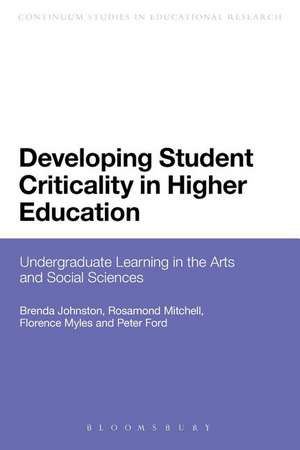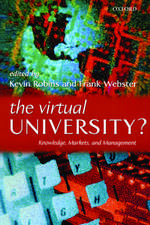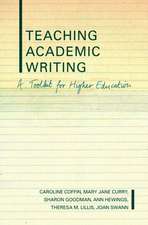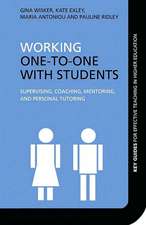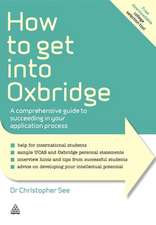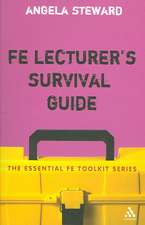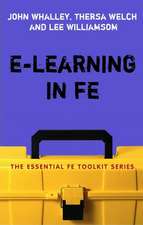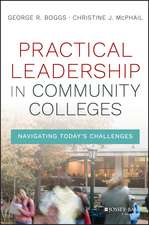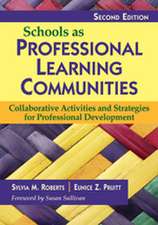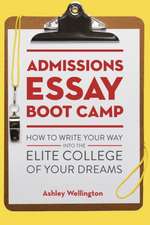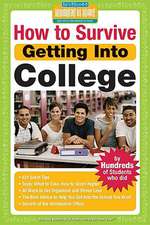Developing Student Criticality in Higher Education: Undergraduate Learning in the Arts and Social Sciences: Continuum Studies in Educational Research
Autor Professor Brenda Johnston, Peter Ford, Rosamond Mitchell, Professor Florence Myles Anthony Haynesen Limba Engleză Paperback – 28 oct 2012
| Toate formatele și edițiile | Preț | Express |
|---|---|---|
| Paperback (1) | 257.50 lei 6-8 săpt. | |
| Bloomsbury Publishing – 28 oct 2012 | 257.50 lei 6-8 săpt. | |
| Hardback (1) | 1066.30 lei 6-8 săpt. | |
| Bloomsbury Publishing – 23 mar 2011 | 1066.30 lei 6-8 săpt. |
Preț: 257.50 lei
Nou
Puncte Express: 386
Preț estimativ în valută:
49.28€ • 51.38$ • 40.95£
49.28€ • 51.38$ • 40.95£
Carte tipărită la comandă
Livrare economică 21 martie-04 aprilie
Preluare comenzi: 021 569.72.76
Specificații
ISBN-13: 9781441137876
ISBN-10: 1441137874
Pagini: 256
Dimensiuni: 156 x 234 x 14 mm
Greutate: 0.36 kg
Editura: Bloomsbury Publishing
Colecția Bloomsbury Academic
Seria Continuum Studies in Educational Research
Locul publicării:London, United Kingdom
ISBN-10: 1441137874
Pagini: 256
Dimensiuni: 156 x 234 x 14 mm
Greutate: 0.36 kg
Editura: Bloomsbury Publishing
Colecția Bloomsbury Academic
Seria Continuum Studies in Educational Research
Locul publicării:London, United Kingdom
Caracteristici
Explores UK and international perspectives on criticality and the conceptualisation of criticality development.
Notă biografică
Rosamond Mitchell is Professor in the School of Humanities and Director of the Centre for Applied Language Research at the University of Southampton, UK.Florence Myles is Professor of Second Language Acquisition at the University of Essex, UK.
Cuprins
1. Introduction \ 2. Conceptualizations of Criticality in Higher Education: Philosophical, Field-Specific and Political Engagement Approaches \ 3. Conceptualizations of Criticality in Higher Education: Psychological Approaches \ 4. A Proposed Framework for Criticality Development \ 5. Criticality Goals in the Undergraduate Curriculum \ 6. Becoming Critical: Teaching and Learning Processes \ 7. Student Writing and Criticality Development \ 8. Experiential Learning and Criticality Development \ 9. Conclusions and Implications \ References \ Index
Recenzii
'This is a timely contribution to current debates concerning the role and purpose of Universities in the twenty first century. For those with a specific interest in teaching and learning in the social sciences, this is a 'must read' text. For others, it provides a rich and fascinating resource for understanding the nature of criticality; both its theoretical underpinnings and empirical evidence of its development in practice. Whilst its focus is on specific fields of study - Modern Languages and Social Work - the authors adopt an interdisciplinary perspective that makes this book relevant to a much wider social science community.' Jackie Powell, Emeritus Professor in Social Work Studies, School of Social Sciences, University of Southampton, UK
'Ask most academics what the most important skill is that students should develop when in higher education and it is likely that critical thinking will be the one which most put at the top of their list. This intriguing book, based on an ESRC funded study, emphasises the context dependent nature of critical thinking, critical self-reflection and critical action. As well as providing an authoritative overview of the concept, the authors examine how undergraduates in modern languages and social work at one research-intensive university experience criticality and how teachers might facilitate the development of criticality. This book makes an important contribution to the development of curriculum policies, assessment strategies and higher education pedagogies.' Mick Healey, HE Consultant and Researcher, Emeritus Professor University of Gloucestershire, UK, Honorary Professor University of Queensland, Australia, Visiting Professor Edinburgh Napier University, UK, and Visiting Professor University of Wales Newport, UK
'This book provides an integration of practical wisdom and theoretical understanding in a difficult area of higher education. It is based on a deep understanding of the issues addressed and a thorough knowledge of existing work in the field.' Lewis Elton, Emeritus Professor, University College, London, UK, Honorary Visiting Professor, University of Gloucestershire, UK, and Distinguished Visiting Scholar, University of Surrey, UK
'Developing Student Criticality in Higher Education meticulously argues for a conceptual framework of criticality in undergraduate education based on innovative and rigorous empirical research. It contextualises the results of this research in a comprehensive historical and global overview of theories of criticality and in doing so raises vital questions about the role of critical thinking in higher education. In doing this it also explores the purpose of higher education in the 21st century. It deserves to be read by both educators and policy makers.' Joan Orme, Emeritus Professor of Social Work, Glasgow School of Social Work, UK
'In this age of instrumentalism, the idea of criticality is falling away and becoming lost from view. And yet it remains a key idea in any serious idea of the university. This book, accordingly, is most timely and much needed, and it not only offers a new framework but shows too how the framework can be applied in practice and how the student experience may be suitably stretched once again. We are in the authors' debt.' Ronald Barnett, Emeritus Professor of Higher Education, Institute of Education, London, UK
This book is an excellent contribution to developmental approaches to criticality. It has already made an invaluable contribution to my own work in both research and curriculum development and is particularly useful for those engaged in transition issues or developing student capacity for success in higher education. It will certainly interest researchers, educators and policy-makers who are searching for a research-led approach to understanding and developing student criticality in an era of rapid change in higher education.
This book is an important contribution to important current debates about higher education... The evident awareness of broader issues affecting higher education means that the authors are able to use their detailed and wide-ranging discussion of criticality to engage with fundamental issues such as the purposes of higher education. In addition to being able to shed light on such issues the authors also engage impressively with the literature.
'Ask most academics what the most important skill is that students should develop when in higher education and it is likely that critical thinking will be the one which most put at the top of their list. This intriguing book, based on an ESRC funded study, emphasises the context dependent nature of critical thinking, critical self-reflection and critical action. As well as providing an authoritative overview of the concept, the authors examine how undergraduates in modern languages and social work at one research-intensive university experience criticality and how teachers might facilitate the development of criticality. This book makes an important contribution to the development of curriculum policies, assessment strategies and higher education pedagogies.' Mick Healey, HE Consultant and Researcher, Emeritus Professor University of Gloucestershire, UK, Honorary Professor University of Queensland, Australia, Visiting Professor Edinburgh Napier University, UK, and Visiting Professor University of Wales Newport, UK
'This book provides an integration of practical wisdom and theoretical understanding in a difficult area of higher education. It is based on a deep understanding of the issues addressed and a thorough knowledge of existing work in the field.' Lewis Elton, Emeritus Professor, University College, London, UK, Honorary Visiting Professor, University of Gloucestershire, UK, and Distinguished Visiting Scholar, University of Surrey, UK
'Developing Student Criticality in Higher Education meticulously argues for a conceptual framework of criticality in undergraduate education based on innovative and rigorous empirical research. It contextualises the results of this research in a comprehensive historical and global overview of theories of criticality and in doing so raises vital questions about the role of critical thinking in higher education. In doing this it also explores the purpose of higher education in the 21st century. It deserves to be read by both educators and policy makers.' Joan Orme, Emeritus Professor of Social Work, Glasgow School of Social Work, UK
'In this age of instrumentalism, the idea of criticality is falling away and becoming lost from view. And yet it remains a key idea in any serious idea of the university. This book, accordingly, is most timely and much needed, and it not only offers a new framework but shows too how the framework can be applied in practice and how the student experience may be suitably stretched once again. We are in the authors' debt.' Ronald Barnett, Emeritus Professor of Higher Education, Institute of Education, London, UK
This book is an excellent contribution to developmental approaches to criticality. It has already made an invaluable contribution to my own work in both research and curriculum development and is particularly useful for those engaged in transition issues or developing student capacity for success in higher education. It will certainly interest researchers, educators and policy-makers who are searching for a research-led approach to understanding and developing student criticality in an era of rapid change in higher education.
This book is an important contribution to important current debates about higher education... The evident awareness of broader issues affecting higher education means that the authors are able to use their detailed and wide-ranging discussion of criticality to engage with fundamental issues such as the purposes of higher education. In addition to being able to shed light on such issues the authors also engage impressively with the literature.
